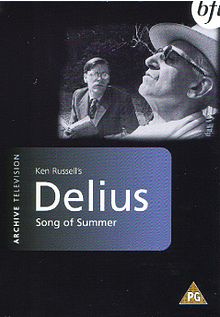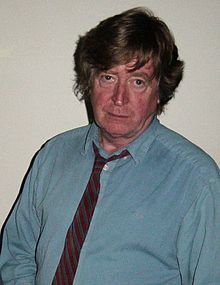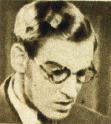Song of Summer
Song of Summer is a 1968 blackandwhite television film written, produced and directed by Ken Russell for the BBCs Omnibus series which was first broadcast onSeptember 1968. It portrays the final six years of the life of Frederick Delius, when he was blind and paralysed, and when Eric Fenby lived with the composer and his wife Jelka as Deliuss amanuensis. The title is borrowed from the Delius tone poem A Song of Summer, which is heard along with other Delius works in the film.
Song of Summer was based on Eric Fenbys memoir Delius As I Knew Him 1936, republished in 1966, which recounts his experience of offering his services in transcribing Frederick Deliuss music from the composers dictation. The 66yearold Delius, who lived with his wife Jelka and their servants at GrezsurLoing, 70 kilometres south of Paris, had never even heard of Fenby, a struggling 22yearold composer and theatre organist living with his parents in Scarborough, North Yorkshire, but he accepted Fenbys unsolicited offer. Fenby stayed with the Deliuses at Grez, on and off for six years, until Deliuss death in 1934. He had immense difficulties in dealing with the cantankerous, irascible and impatient composer perhaps partly excused by his constant pain. Neither party had ever worked this way before, but Fenby was immediately expected to keep up with Deliuss fast pace when dictating, and to make sense of his outoftune singing. He was also required to read for long stretches to Delius, the composers favourite books being Mark Twains Adventures of Huckleberry Finn and Tom Sawyer. Fenby was a devout Catholic and Delius hated Christianity, even going so far as to say that Fenby should not go to the local chapel but visit one further away. On his first visit home, Fenby had a nervous breakdown and lost the use of his own legs for two weeks. Later, Jelka needed to go for treatment for stomach cancer, and Fenby virtually became Deliuss nurse for a month. Delius died only two days after Jelka returned.Eric Fenby coached actors Max Adrian Delius and Christopher Gable Fenby in their roles and regarded their portrayals as absolutely true to character and the film as disturbingly lifelike. However, he did not attend the actual filming, in order not to distract the director, and also on request from Christopher Gable, who was making his first film he had previously been a dancer with the Royal Ballet. Max Adrian was a favourite actor of Ken Russells. Adrian told Fenby that h
Source: Wikipedia




